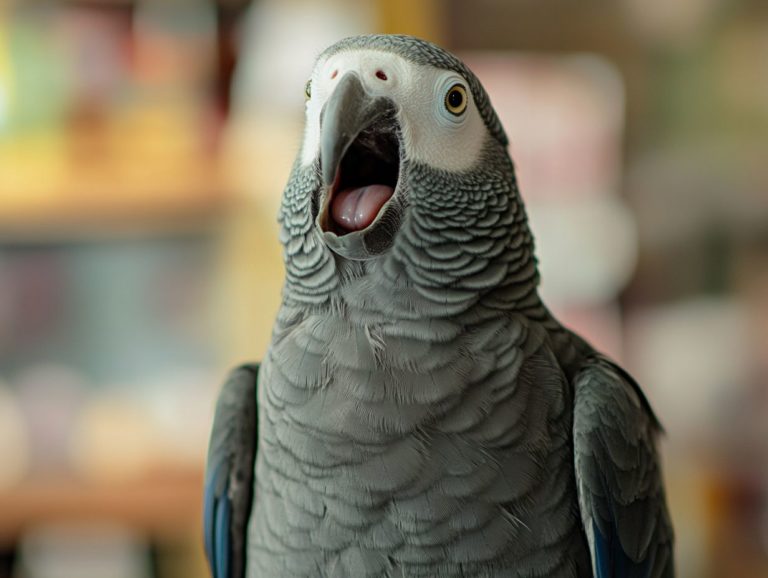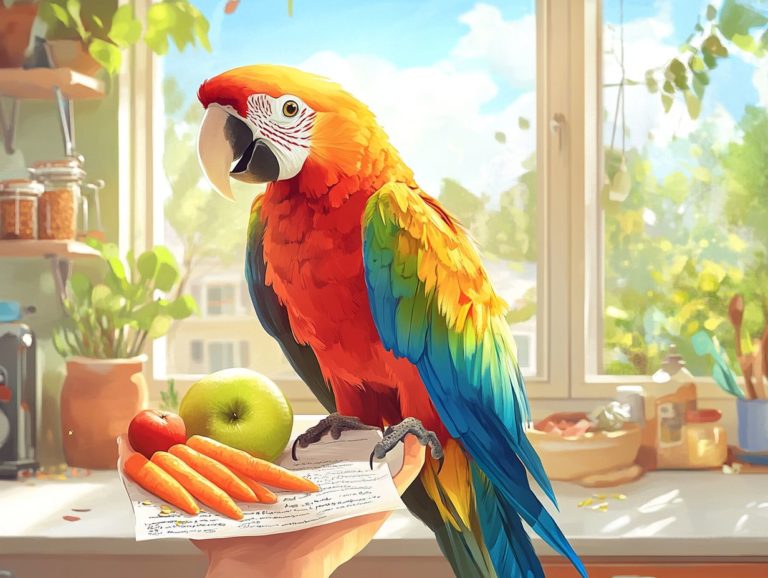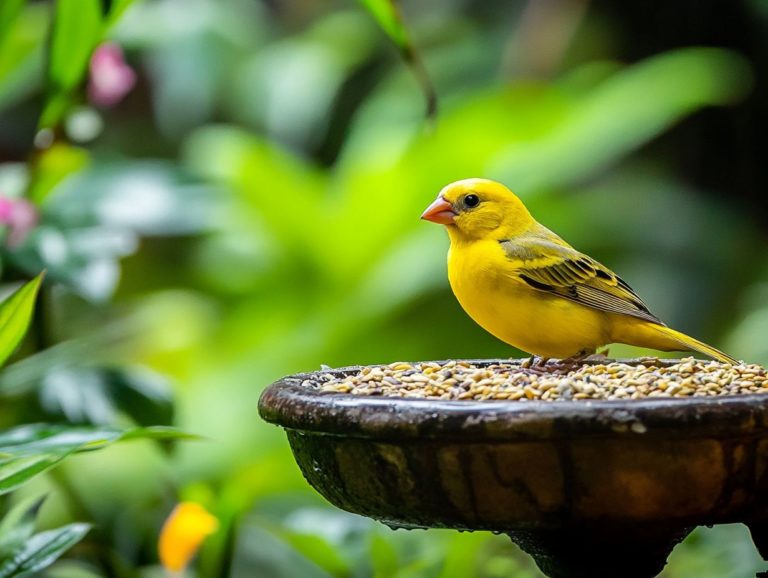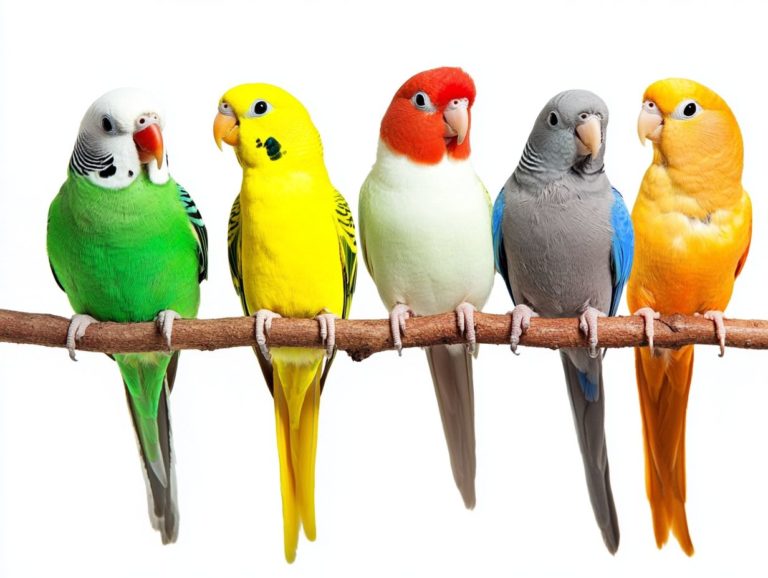Canary Care: Tips for a Healthy and Happy Life
Canaries are truly delightful companions, celebrated for their cheerful songs and vibrant colors. To ensure these charming birds thrive, it s vital to grasp their unique needs fully.
This guide will assist you in creating a healthy environment for your canary, covering everything from proper cage setup and nutrition to engaging activities. You ll also find insights into common health issues, how to identify them, and the importance of preventive care.
Discover how to keep your canary happy and healthy for years to come!
Contents
- Key Takeaways:
- Understanding the Needs of Canaries
- Creating a Healthy Environment
- Keeping Your Canary Happy
- Common Health Issues in Canaries
- Preventive Measures for Canary Health
- Frequently Asked Questions
- 1. What are some essential tips for maintaining a healthy and happy life for my canary?
- 2. How often should I clean my canary’s cage?
- 3. Is it necessary to provide my canary with toys and enrichment activities?
- 4. Can I take my canary outside for fresh air and sunlight?
- 5. How often should I take my canary to the vet for check-ups?
- 6. What are some common signs of illness in canaries?
Key Takeaways:
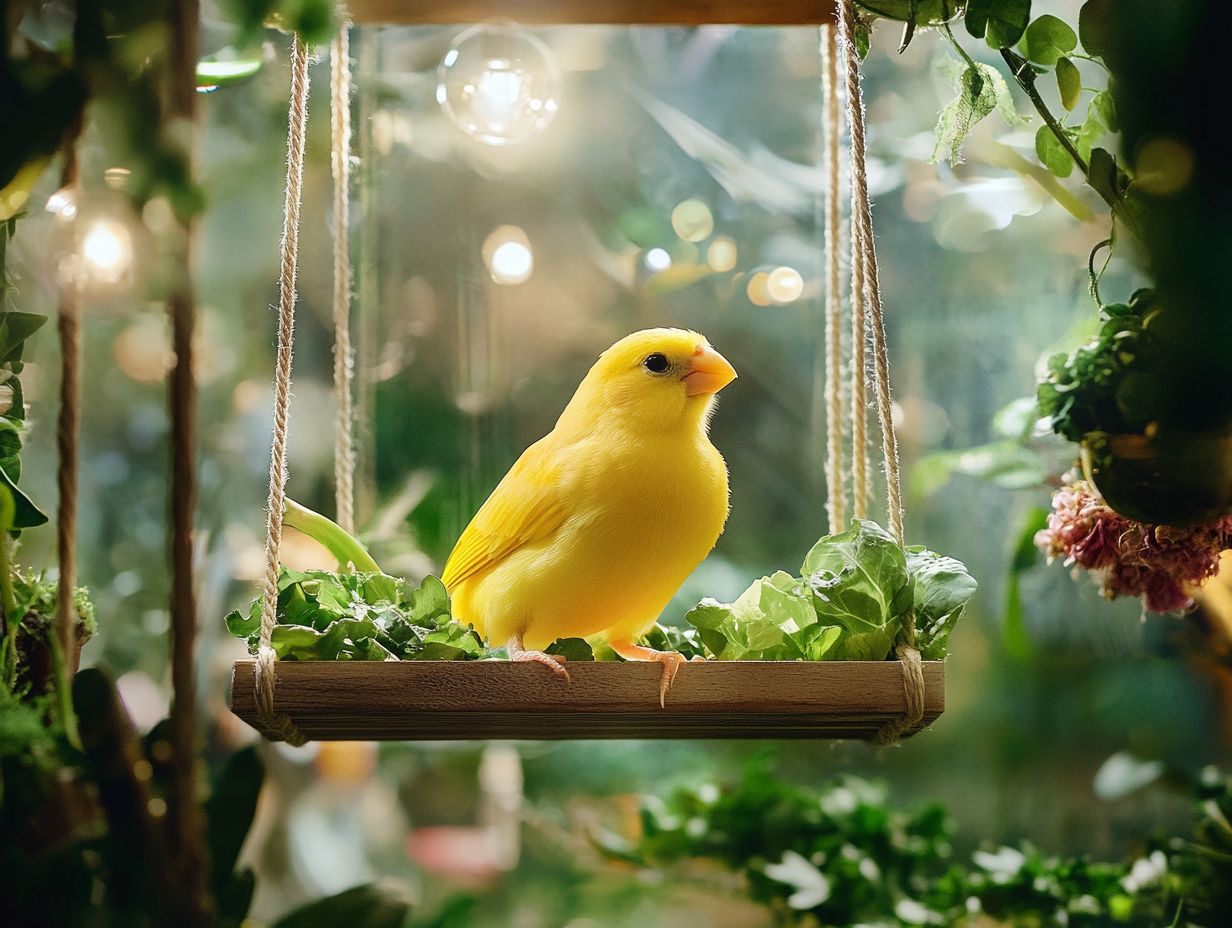
Understanding the Needs of Canaries
Understanding the needs of canaries is key to their well-being and happiness. These cherished birds require attentive care that supports their physical health and social interactions.
Canaries thrive in settings that mimic their natural habitats like the Canary Islands. They need a balanced diet, clean living spaces, and regular social engagement to flourish.
When you witness their vibrant songs and playful behaviors, you know you re nurturing a healthy and content canary. Catering to their specific requirements is crucial for providing them with a fulfilling life.
Creating a Healthy Environment
Creating a caring environment for your canary is vital for its well-being and longevity. A well-designed cage is not just a safe space; it encourages physical and mental stimulation.
Ensure the cage is spacious enough and filled with suitable toys and perches. Always keep it stocked with fresh water.
Exposing your canary to natural sunlight significantly impacts its overall health, cultivating an atmosphere where your feathered friend can truly thrive.
Proper Cage Setup and Maintenance
Proper cage setup and maintenance are crucial for your canary s health and happiness. A suitable cage should allow for flight, have wooden perches, and use cage paper for easy cleaning.
Follow a regular cleaning routine to prevent waste and bacteria from building up. This keeps your bird s space hygienic.
When choosing toys and activities that keep your canary active, include swings and bells, and provide hiding spots for a sense of security.
Don t wait regularly replace the cage paper and wash perches and toys with bird-safe cleaners to eliminate any harmful pathogens. Creating a clean and enriching habitat not only enhances your canary s quality of life but also strengthens the bond between you and your feathered friend, making the experience rewarding for both of you.
Importance of Diet and Nutrition
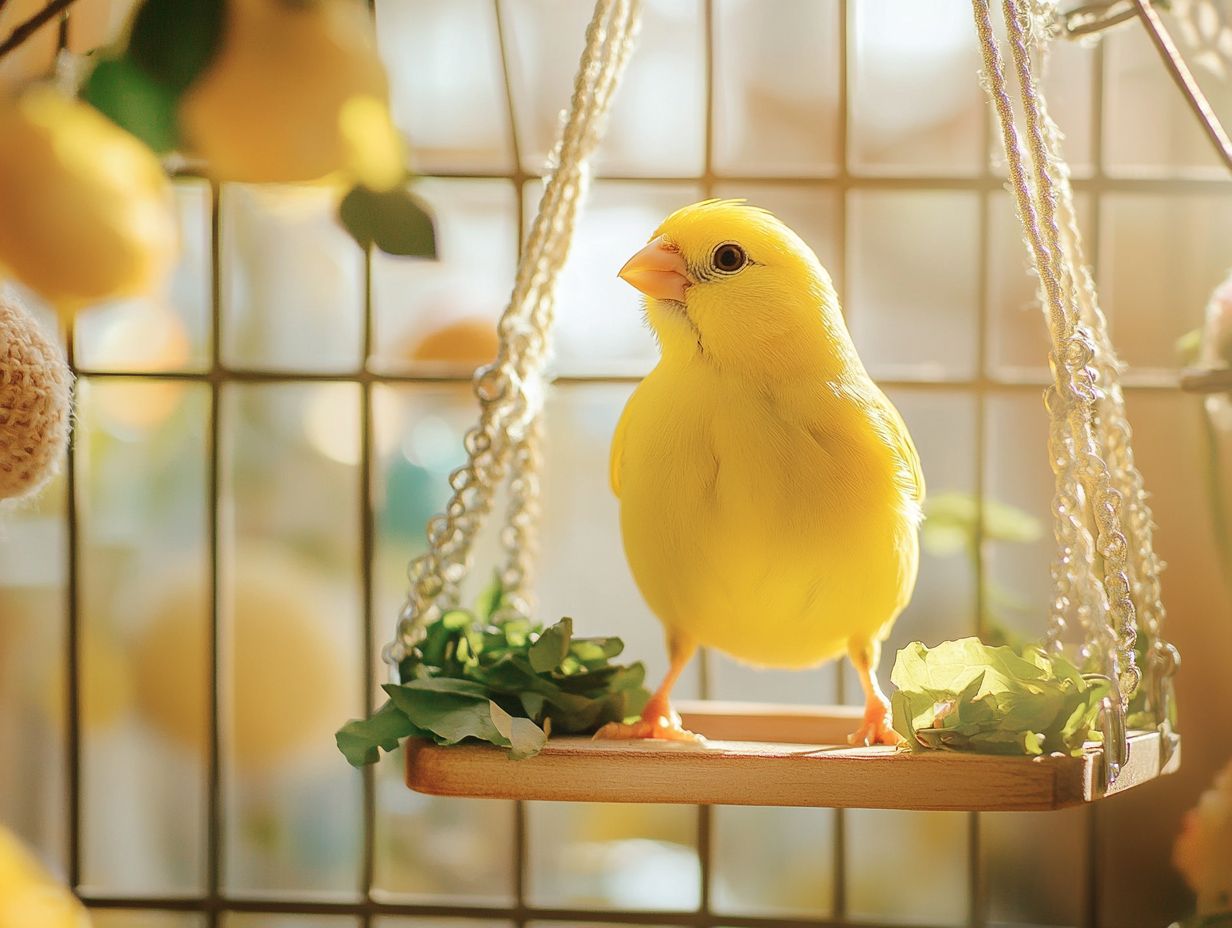
The significance of diet and nutrition is paramount for keeping your canary healthy and vibrant. A good diet includes high-quality seed mixes and fresh fruits and veggies, which provide essential nutrients for optimal health.
Consider adding vitamin supplements to prevent deficiencies. This ensures your canaries receive the nutrition necessary for their activity levels and overall well-being.
Regular feeding times are vital for a healthy routine. Twice-daily feedings are often recommended to guarantee freshness and encourage natural foraging behaviors.
Portion control is equally important provide just enough seed and fresh produce to last until the next feeding. This minimizes waste and avoids picky eating habits.
By varying their diet to include leafy greens like kale and small amounts of nuts, you can create a diverse meal plan that meets the nutritional needs of both male and female canaries, considering their differing activity levels and breeding times.
Regularly rotating food types keeps mealtime exciting and promotes balanced nutrition for your feathered companions.
Keeping Your Canary Happy
Ensuring your canary’s happiness is crucial because content birds are far less susceptible to stress and health complications. Engaging your canary with enrichment activities and fostering social interactions are essential for their mental stimulation and overall well-being.
Offering a diverse array of canary toys and ample opportunities for interaction can significantly elevate your pet’s happiness. This leads to increased activity and vocalization, which are true hallmarks of a joyful canary.
Enrichment Activities and Socialization
Enrichment activities and socialization enhance your canaries’ quality of life. Providing a variety of canary toys stimulates their natural instincts and encourages playful behaviors that promote both physical exercise and mental engagement.
Socializing with you or other canaries can significantly reduce stress and loneliness, fostering a more balanced demeanor and enhancing their overall happiness.
Incorporating safe perches, mirrors, and swings creates an engaging environment that mimics their natural habitat. This encourages exploration and play. Interacting with your canary through gentle handling and verbal communication strengthens your bond, leading to a more fulfilling relationship.
Regularly introducing new toys and engaging in short training sessions not only keeps boredom at bay but also instills confidence in your feathered friends. These fun activities, along with social interaction, contribute to their emotional well-being, resulting in a happier and more vibrant life.
Common Health Issues in Canaries
Health problems in canaries can be serious, emphasizing the need for you, as a bird owner, to stay vigilant about potential issues. Factors like diet, environment, and genetics can influence your canary’s health.
Give your feathered friend the best care possible by scheduling regular check-ups with an avian vet. This proactive approach is crucial for early detection and treatment of health concerns, enhancing your canary’s lifespan and overall quality of life.
Identifying and Treating Illnesses
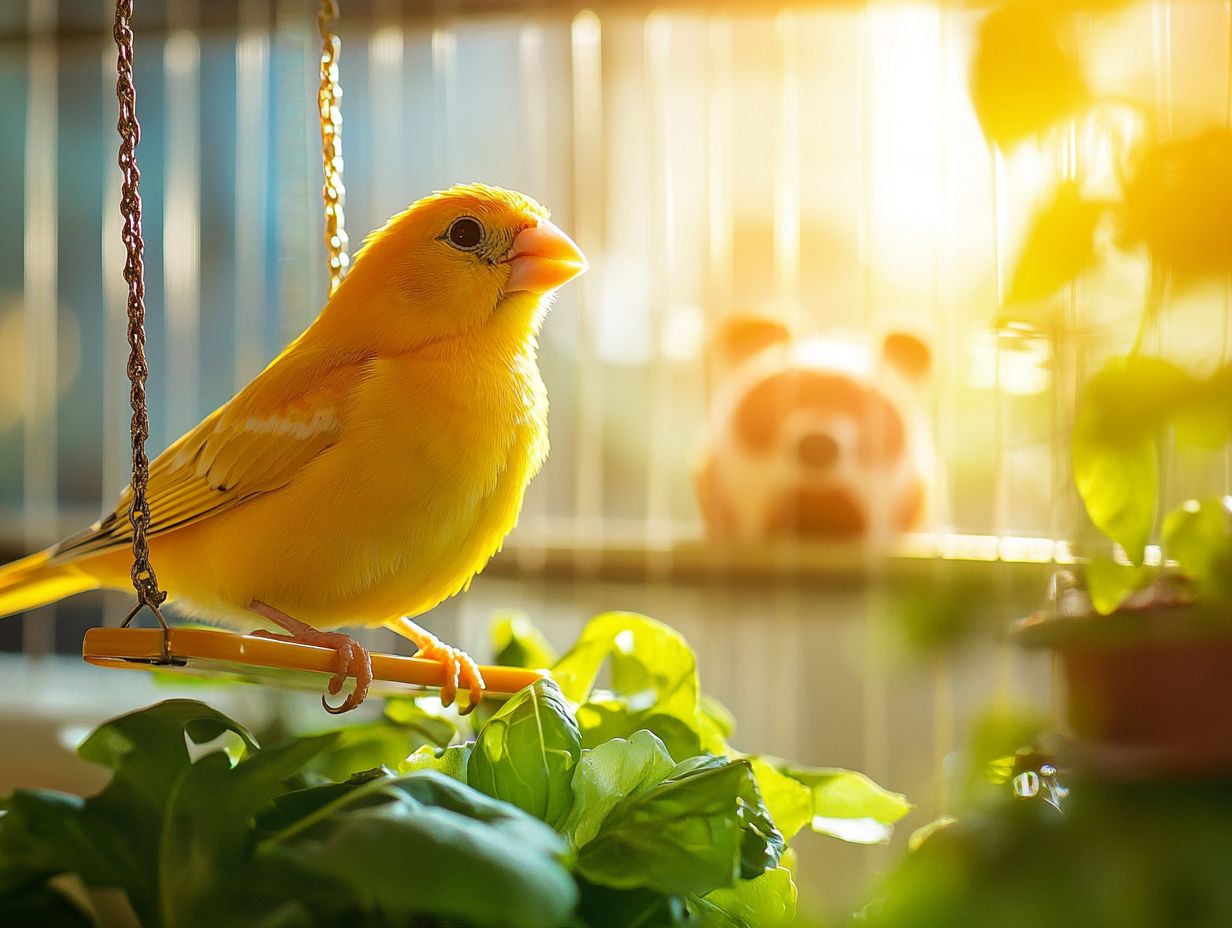
Identifying and treating illnesses in canaries demands your vigilant attention and a solid understanding of their health indicators. You should familiarize yourself with normal canary behavior and appearance so you can easily spot any changes that may signal health issues. Regular check-ups with an avian vet (a veterinarian who specializes in birds) can facilitate early diagnosis. Quick action can save your canary and help it thrive.
To effectively monitor your canary’s health, keep an eye out for symptoms like changes in appetite, unusual vocalizations, lethargy, or feathers that appear ruffled or dull. Inconsistent droppings are also worth noting. Physical signs such as respiratory difficulties or swollen eyes can serve as important red flags.
By quickly recognizing these indicators, you can seek veterinary assistance, which is crucial in diagnosing and managing illnesses.
Acting quickly increases the chances of recovery and improves your canary’s overall health. Prioritizing avian healthcare ensures your canaries remain lively companions for years to come.
Preventive Measures for Canary Health
Preventive measures for your canary s health are essential for ensuring a long and vibrant life for your feathered companion. Regular veterinary check-ups play a pivotal role in monitoring your canary s health and identifying potential issues before they escalate.
Keep your canary s cage clean and provide a balanced diet. This creates a nurturing environment that minimizes the risk of illnesses and fosters overall well-being.
Regular Vet Check-ups and Hygiene Practices
Regular veterinary check-ups and robust hygiene practices are paramount for ensuring your canary remains in peak health. By scheduling routine visits with an avian vet, you can catch early signs of illness and gain valuable insights into your bird’s unique care requirements.
Maintaining a strict hygiene regimen like cleaning your canary’s cage regularly creates a safe and healthy environment, minimizing disease risks and nurturing a joyful canary.
Incorporating daily habits such as checking the freshness of food and water, thoroughly sanitizing food dishes, and frequently replacing bedding can further bolster this proactive approach. It’s vital to pay special attention to reducing drafts and managing humidity levels in your canary’s living space.
These consistent hygiene efforts not only foster a cleaner habitat but also significantly enhance your bird s overall well-being. Learn about common canary health issues to help you spot potential problems early, greatly improving the odds of effective intervention.
Frequently Asked Questions
1. What are some essential tips for maintaining a healthy and happy life for my canary?

To keep your canary healthy and happy, make sure to provide a balanced diet, clean water, regular exercise, and follow guidelines on how to keep your bird healthy and happy, including proper grooming and hygiene.
2. How often should I clean my canary’s cage?
It is recommended to clean your canary’s cage at least once a week. However, if you notice any buildup of waste or debris, it is best to clean it more frequently.
3. Is it necessary to provide my canary with toys and enrichment activities?
Yes, canaries are active and social birds that need stimulation to thrive. It is important to provide them with toys, perches, and activities to keep them mentally and physically engaged.
4. Can I take my canary outside for fresh air and sunlight?
Yes, canaries enjoy spending time outside in a safe and secure environment. Just make sure to keep a close eye on them and protect them from any potential predators.
5. How often should I take my canary to the vet for check-ups?
It is recommended to take your canary to the vet for a check-up at least once a year. However, if you notice any changes in their behavior or health, it is best to schedule an appointment as soon as possible.
6. What are some common signs of illness in canaries?
Look out for signs that your canary may be unwell. Common symptoms include changes in appetite, behavior, and appearance.
Fluffed feathers, discharge from the eyes or nose, and difficulty breathing are all red flags. If you see any of these signs, take your bird to the vet for a check-up right away!


